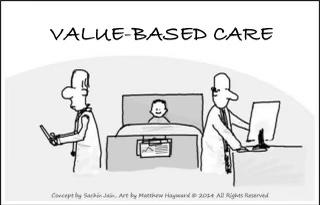What Is Value-Based Healthcare, Really?

VALUE-BASED CARE HAS BEEN HELD OUT AS A PANACEA FOR AMERICAN HEALTHCARE. BUT IS IT REALLY?
MATTHEW HAYWARD
Attend any healthcare convention and also you’ll rapidly uncover that it’s turn out to be downright modern for healthcare leaders to speak about their unwavering dedication to “value-based care.”
The expression has turn out to be ubiquitous in healthcare circles. Its virtuousness goes unchallenged.
However ought to that be the case?
Michael E. Porter and Elizabeth Teisberg (with whom I labored as a pupil and researcher at Harvard Enterprise Faculty from 2006-2010) popularized the worth equation (Worth = High quality/Price) and advised that enhancing worth must be any healthcare system chief’s highest purpose.
Since that point, the federal authorities has launched numerous coverage devices to speed up the transition to value-based care together with Medicare Benefit, accountable care organizations, and bundled fee fashions.
New startups—corresponding to Aledade, Iora Well being, Landmark Well being, Oak Avenue Well being, and VillageMD—have arisen with the intent of bringing value-based care to the plenty.
And large-box retailers corresponding to CVS, Walgreens, and Walmart, too, have jumped on the worth bandwagon.
The underlying precept of “value-based care” is straightforward sufficient—managing to a decrease value of look after a inhabitants of sufferers, whereas aiming to enhance outcomes.
However what does this value-based care appear like in apply within the real-world of affected person care (past the trade convention jargon and tutorial expositions on the topic)?
I received the concept for this column after a current name with a detailed professor pal who has lengthy been a fan of value-based care. On our name, he expressed dismay at his mom’s care in a value-based medical group that was contracted along with her Medicare Benefit plan.
On one event, his mom was discharged from a hospital before he felt she ought to have been (she was later readmitted). On one other event, she was denied entry to a tertiary most cancers middle, the place he believed she ought to have gone for a second opinion. And on a 3rd event, she was denied entry to a specialist who my pal felt might have corrected an earlier, botched cataract surgical procedure.
As my pal decried his mom’s care expertise, I couldn’t assist however suppose that he (and others) are one way or the other failing to attach the dots between the promise of value-based care and its real-world implications. Which received me considering that it maybe is likely to be useful for all of us to look intently at what value-based care means—good and dangerous—for sufferers receiving care ruled by its ideas.
These observations come up from my time as an educational finding out value-based care; my management of CareMore and Aspire Well being, the value-based care supply divisions of Anthem Inc; and my present function main SCAN Health Plan, a non-profit Medicare Benefit well being plan that companions intently with many value-based teams.
Anti-Hospital?
Whereas pharmaceutical prices get plenty of consideration, the one costliest line merchandise for a lot of teams working within the “value-based care” area is administration of acute hospital mattress days. A day within the hospital can value as a lot as $3,000-$4,000. Given these hefty value implications of a single day within the hospital, leaders of many value-based care organizations are within the behavior of monitoring hospital mattress days (mattress days/1,000 sufferers) and admission charges (admissions/1,000 sufferers) each day. The decrease the numbers the higher.
The general purpose is to attempt to keep away from hospitalizations by intently managing sufferers in outpatient clinics and typically immediately admitting sufferers to expert nursing services, whose prices are considerably decrease than these of hospitals. Intensive outpatient administration typically contains enhanced entry to major and pressing care and higher administration of power illness—all with the purpose of decreasing emergency room visits and subsequent hospitalizations. Many value-based care teams additionally make home calls to sufferers. The extra technologically-enabled ones remotely monitor sufferers at notably excessive threat of hospitalization.
Such aggressive mattress day administration typically interprets into decrease hospitalization charges and shortened hospitalizations, however it will possibly typically go away sufferers and households feeling rushed and neglected of their most susceptible moments. Sufferers who anticipate (and typically want) lengthy hospital stays is likely to be stunned after they’re discharged quickly to their houses with dwelling care companies or to skilled-nursing services in lieu of an additional few nights within the hospital.
As well as, many value-based care teams prioritize palliative care and proactively transition sufferers to hospice—partially, as a result of it’s typically the suitable factor to do, and partially as a result of sufferers with end-stage situations typically get admitted to the hospital and make the most of numerous costly (and futile) hospital mattress days. Sufferers in these teams typically really feel that their medical doctors are dashing them down the trail of palliative care and hospice prematurely, after they themselves have a need to maintain combating their sicknesses.
Anti-Specialist?
Like hospitalizations, specialist care—with all of its related checks and diagnostic procedures—could be costly. In fee-for-service environments, major care physicians typically refer sufferers reflexively. Chest ache? Heart specialist. Abdomen ache? Gastroenterologist. Rash? Dermatologist. Aggressive specialty session is a mainstay for a lot of fee-for-service major care medical doctors.
In value-based care organizations, sufferers benefit within the palms of assured generalist major care physicians who take extra accountability for sufferers and their outcomes than those that work in conventional major care fashions. These generalist medical doctors solely consult with specialists after they want a complicated opinion or the affected person requires a process that they aren’t capable of carry out themselves.
After all, there could be a draw back. Sufferers who belong within the palms of specialists are typically delayed getting there—and might undergo and have poor outcomes on account of these delays. Due to the deal with gatekeeping, sufferers typically discover themselves pissed off by utilization administration—the executive course of via which well being plans and medical teams evaluate referrals to specialists and orders for diagnostic checks. And sufferers aren’t the one ones complaining. Virtually each working towards physician will let you know tales about how a lot work it typically takes to acquire approval for referrals which might be completely needed and simply make frequent sense.
Anti-Alternative?
Many value-based care teams contract with slim networks of specialists and medical facilities. Members of those networks are normally chosen as a result of they’ve relationships with the first care teams and are typically employed members of their group (as with Kaiser Permanente).
More and more, teams are utilizing community analytic instruments like Cotivity’s RowdMap and Embold Health to determine so-called “excessive worth physicians” who’re considerate and cautious about their use of diagnostic checks and procedures.
The advantages of those sorts of networks are manifold. Teams fastidiously curate specialists who talk and coordinate successfully with major care physicians and apply high-quality, evidence-based medication. Group number of specialists eliminates the guess-work that typically plagues sufferers (“Who ought to I see for….?”). And these specialists typically function on frequent digital well being document programs that may extra seamlessly facilitate care coordination and the stream of affected person info throughout scientific websites.
The draw back is that some value-based networks are so centered on value administration that they have a tendency to contract with specialists and hospitals primarily based extra on value than on high quality. Many “value-based” teams appear to keep away from contracting with essentially the most respected (and typically greater high quality) hospitals and their related doctor teams as a result of they’re costly. Sufferers used to going to no matter facility they like for care are sometimes stunned at how slim the choices are inside their networks, particularly within the unlucky circumstances when sufferers have a tendency to hunt out extremely specialised care services (i.e. most cancers facilities) and specialists.
As well as, some sufferers discover that small, fastidiously curated specialist networks topic them to vital, probably dangerous delays in accessing care.
Professional Teamwork?
Once more, in search of to scale back prices, many value-based care teams typically introduce new sorts of clinicians within the care of sufferers. That is steadily generally known as “working towards on the high of the license.” In apply, it means teams complement the work of physicians with nurse practitioners, pharmacists, doctor assistants, registered nurses, medical assistants, and group well being staff.
The addition of those scientific practitioners can enhance entry to care and likewise enhance outcomes after they work as a part of a group to extra successfully coordinate the care of sufferers and handle their power situations. One of the best value-based care teams have clear and efficient rubrics for a way all members of the scientific groups work collectively to serve sufferers.
Then again, sufferers who need to see physicians—or, typically, want to see physicians—typically get pissed off that entry to generalist physicians (and specialists) is likely to be restricted by non-physician gatekeepers. What’s extra, the worst value-based care teams use professionals of every type interchangeably with out paying shut consideration to variations in abilities and data throughout clinician sorts—or articulating a transparent view as to the best way to coordinate efforts throughout disciplines.
Anti-Innovation?
Worth-based care teams which might be managing to the price/high quality threshold are sometimes fairly conservative within the improvement of the formularies they make use of for the care of sufferers.
In apply, this implies they have a tendency to favor medicine with a major proof base and sometimes prioritize the supply of non-branded generic prescribed drugs in lieu of branded medicine, and typically older medicine in lieu of newer medicine. What this interprets to for price-sensitive sufferers is usually decrease drug prices and a deal with affordability of the therapies that they’re prescribed.
That stated, some critics argue that value-based organizations typically appear anti-innovation, as they are often sluggish to undertake new medicine on formularies and are typically price-focused to the purpose of ignoring greater value medicine that may meaningfully alleviate sufferers’ struggling. The identical could be stated about superior diagnostics and newer procedural interventions.
Worth-based care teams can rapidly discover themselves at odds with their sufferers when their suggestions and remedy plans contradict what sufferers themselves be taught doing their very own analysis on the most effective and most fashionable plan of action for his or her situation.
Professional Non-Scientific Interventions?
Many teams which might be “value-based” assume full accountability (typically generally known as “full threat”) for the whole value of care. These teams, that are recognized for making an attempt to drive on the root reason behind why somebody is consuming healthcare companies, typically deal with non-traditional, non-medical interventions that enhance outcomes whereas reducing the whole value of look after sufferers.
After I was at CareMore, our care administration group as soon as procured a fridge for a affected person who wanted it to retailer his insulin, recognizing that with out the fridge, the affected person would seemingly land within the hospital with excessive blood sugar. Rushika Fernandopulle, the founding father of Iora Well being, tells the story of shopping for an Apple iPod to appease a affected person whose nervousness led him to the emergency room greater than 100 occasions a 12 months. At SCAN, our Healthcare in Action medical group, which treats folks experiencing homelessness, typically offers cell telephones to sufferers; connectivity is vital for folks making an attempt to entry shelter housing.
Some folks, listening to these distinctive tales, may argue that they’re simply that—tales—that don’t mirror their very own expertise of care. And few large-scale research of interventions to handle social determinants of well being have did not display any significant healthcare high quality or value profit to the packages.
What’s extra, whereas many value-based care organizations (together with two I’ve led) present entry to gymnasium advantages, transportation, meals, and different interventions designed to enhance key drivers of well being, the revealed literature doesn’t help the notion that these advantages have a significant impact on value or the standard of outcomes—although the impact on choose particular person sufferers is incontrovertible.
Excessively Income-Targeted?
Whereas in its purest kind, value-based healthcare is about reducing the whole value of care by guaranteeing that sufferers are more healthy and are making considered use of the healthcare system, many organizations spend vital power making an attempt to optimize revenues they earn serving sufferers.
Payers (together with the federal Medicare program) sometimes modify funds for sufferers primarily based on the severity of their sicknesses. In consequence, many value-based care organizations spend vital power documenting the severity of sickness—time some sufferers could really feel takes away from truly caring for them. For instance, some medical teams make use of home-based “welcome visits” from third-party distributors separate from annual physicals. The aim of those visits is under no circumstances clear to sufferers. However for the medical teams, these “welcome visits” determine unmet medical wants and set off applicable referrals, whereas enabling teams to doc the entire medical situations sufferers expertise.
But as few would dispute, at their worst, these visits are typically completely divorced from a affected person’s care and serve completely to maximise the funds teams obtain from payers. A majority of these visits are sometimes thought to be non-value added overhead.
In Whose Greatest Curiosity?
As I defined to my pal who was involved about his mom’s care, the untold story of value-based care is that reducing the whole value of care whereas enhancing high quality essentially means creating some abrasion for some sufferers a few of the time. And with this abrasion will inevitably come the sensation of a battle of curiosity, actual or imagined. The monetary bottom-line of the physician and his medical group could typically go towards the care that the affected person feels she or he wants. As my late economics instructor, Martin S. Feldstein, typically stated, “There’s no such factor as a free lunch.”
When a health care provider denies a affected person a check or new drug or referral to a specialist, is it as a result of we’re actually optimizing the care of the affected person?
Or is it as a result of we’re optimizing the economics of the value-based group?
In an period when many “value-based teams” are backed by enterprise capital, owned by personal fairness companies, or publicly traded, is the choice to disclaim a specialist referral or the newest new pharmaceutical being made to optimize care or to guard quarterly earnings?
Stated one other approach, is the close to time period motion centered on the price portion of the famed worth equation? Or the standard portion?
It’s not all the time straightforward to know.
This set of questions and observations shouldn’t be learn as a protection of the pricey, conventional fee-for-service system, which has its personal skew in the direction of over-delivering care, typically with little to no profit to sufferers. Nor ought to it’s learn as a rebuke of value-based care.
However with the entire optimistic fanfare (a small portion of which I, too, am responsible of producing) should additionally come a dose of realism. Worth-based care can certainly be a solution to a few of what ails American healthcare, however at its basis there have to be one thing considerably more and more quaint and elusive:
An moral underpinning to all the time do what’s proper for the affected person.
For value-based care to succeed, teams will need to have a sturdy scientific (and monetary) tradition in place to make sure that aggressive practices to handle prices are pursued via the lens of true profit to the affected person, not the monetary pursuits of the group. The actions to which we topic sufferers have to be guided by the “radical frequent sense” that each one of us would need to see in play for ourselves and our mother and father.
Absent such a tradition, value-based care would be the newest technique we undertake to erode essentially the most treasured asset we’ve got within the American healthcare system: the belief of the folks we serve.




